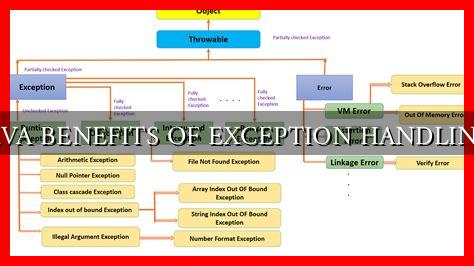-
Table of Contents
The Benefits of Exception Handling in Java
Exception handling is a crucial aspect of programming in Java that allows developers to manage errors and unexpected situations effectively. By incorporating exception handling mechanisms in their code, developers can improve the reliability, maintainability, and robustness of their applications. In this article, we will explore the various benefits of exception handling in Java and how it can enhance the overall quality of software development.
1. Improved Code Readability
Exception handling helps in separating the error-handling logic from the main code, making the code more readable and maintainable. By using try-catch blocks, developers can isolate the error-handling code and focus on the main functionality of the program. This separation of concerns enhances the overall clarity of the codebase and makes it easier for developers to understand and debug the code.
2. Enhanced Error Reporting
Exception handling provides a structured way to report errors and exceptions that occur during the execution of a program. By throwing and catching exceptions, developers can identify the root cause of errors and take appropriate actions to handle them. This helps in improving the overall error reporting mechanism and allows developers to diagnose and fix issues more efficiently.
3. Robustness and Reliability
Exception handling plays a crucial role in enhancing the robustness and reliability of Java applications. By handling exceptions gracefully, developers can prevent their programs from crashing or behaving unpredictably when errors occur. This ensures that the application continues to run smoothly even in the presence of unexpected situations, making it more reliable for end-users.
4. Graceful Degradation
Exception handling allows developers to implement graceful degradation strategies in their code, where the application can gracefully recover from errors and continue to function without compromising its core functionality. By catching and handling exceptions appropriately, developers can ensure that the application remains responsive and user-friendly even in the face of errors.
5. Better User Experience
Effective exception handling can significantly improve the user experience of Java applications by providing informative error messages and guiding users on how to resolve issues. By handling exceptions proactively and communicating errors clearly to users, developers can enhance the overall usability and user satisfaction of their applications.
6. Prevention of Resource Leaks
Exception handling helps in preventing resource leaks by ensuring that resources are properly released and cleaned up when errors occur. By using try-with-resources blocks, developers can automatically close resources such as files, database connections, and network sockets, even in the presence of exceptions. This helps in avoiding memory leaks and resource exhaustion issues in Java applications.
Conclusion
Exception handling is an essential aspect of Java programming that offers numerous benefits in terms of code readability, error reporting, robustness, reliability, user experience, and resource management. By incorporating exception handling mechanisms in their code, developers can build more resilient and user-friendly applications that are better equipped to handle errors and unexpected situations. It is crucial for developers to understand the importance of exception handling and leverage its capabilities to enhance the overall quality of software development.
For more information on exception handling in Java, you can refer to the official Java documentation here.


